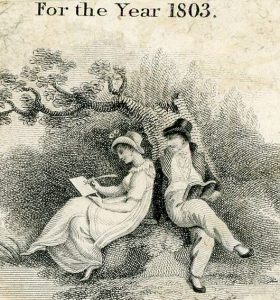Lonely Hearts in 1802-1805
Dating websites may feel like a modern day concept but the idea is far from original. In post-revolutionary France it was the custom for such personal advertisements to be pasted in public places. Amongst them were the fortune-hunters . . .
“A young man, without actual fortune, but having a person and education fit to appear in any company, and an amiable character, such as may please any reasonable and sensible woman; of respectable parents, who were formerly very rich, and are still at their ease, but have a numerous family; aspires to hope that he may find, a lady generous enough to seek his acquaintance, choose him as husband, and share her fortune with him.”
“A young lady aged eighteen, fresh and beautiful as a new blown flower, and endowed with all the graces and talents which increase the charms of beauty, but without fortune, in consequence of disasters which have happened to her parents, is offered by them to a man of sensibility who would share with her a decent existence.”
and the fortune owners . . .
“A lady aged thirty-two, but who might pass for twenty-seven, having a plump and fresh person, a widow without children, with education, morals, and possessing some agreeable talents, desires to be united to a bachelor aged between thirty-five and forty two, of a tolerable exterior, and good health, with at least five thousand francs of patrimonial income in the neighbourhood of Paris. This lady … has since realised her fortune, which amounts to one hundred and twenty-five thousand francs, which she means to lay out in land.”
“An amiable lady, entering into the autumn of her age, of a lively disposition, good education, and irreproachable manners, worth between twenty-five and thirty thousand francs wishes to marry a bachelor aged between forty and fifty, with a revenue between three and four thousand francs, health, and good morals.”
and the rather more desperate . . .
“A lady wishes to be united to a bachelor of an extremely mild and polite character, capable of attachment and attentions to a woman of whom nature has neglected the personal attractions, and has even afflicted with deafness, but endowed with a feeling soul and a generous spirit. Nor would she propose, in contracting the sacred bonds of marriage, to purchase the compliance and cares of her husband, but would only ally herself with one who could prove a decent existence . . . of an age between thirty-five and forty-five.”
SOURCE: Recollections of Paris in the Years 1802-3-4-5 (pub. 1806)
